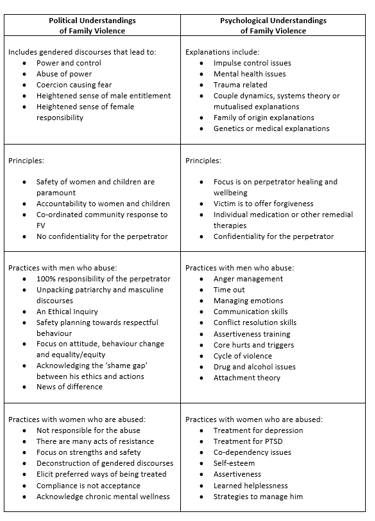Unveiling the Political Nature of Family Violence
This discussion busts the myth that family violence is a psychological problem


Engaging with family violence from a political perspective necessitates a profound shift away from conventional psychological interpretations. This approach argues that the roots of violence are deeply embedded in political and societal structures rather than being purely the result of individual psychological disturbances. This view encourages interventions that address the societal norms and power imbalances that tacitly condone or perpetuate violence.
Historically, family violence has been framed within a psychological paradigm, focusing on individual pathologies and interpersonal dynamics. This often leads to treatments that prioritize modifying the perpetrator’s behavior through cognitive-behavioral interventions, anger management, and other similar therapies. These strategies are based on the assumption that violence stems from individual deficiencies such as poor impulse control, mental health issues, or problematic personal histories.
In contrast, a political understanding of family violence scrutinizes the societal norms that perpetuate the roles of power and control within relationships. This perspective highlights how societal structures and cultural norms create a breeding ground for violence through constructs such as male entitlement and female responsibility. Such a framework views family violence not just as a personal issue but as a complex interplay of societal expectations and individual actions. See the table below that summarizes these understandings.


The political approach involves unpacking entrenched societal and cultural narratives that uphold patriarchal views and perpetuate gender inequality. It emphasizes the need for a coordinated community response that goes beyond treating symptoms to addressing the root causes of violence. This includes challenging the societal norms that underpin the abuse of power and advocating for systemic changes that promote equity and respect across all levels of society.
Engaging with family violence as a political issue involves holding perpetrators accountable for their actions while also understanding the societal influences that shape their behaviors. In practice, this involves the deconstruction of the dominant discourses of masculinity and inviting men to explore their relationship to those ideas that support violence and abuse. When these ideas and their effects are exposed, the men can reinvent their relationship with them which is more preferred.
The unpacking of societal norms creates an environment to question these norms rather than the norms questioning the men. This gives men the power to make better choices in behavior that are safer and more preferred. For example, owning his partner or treating her as a possession is one of the most common and dominant ideas that support abusive and violent behavior. Replacing this with the idea of partnership and fairness provides a platform for new behaviours that are safer.
The application of a political lens to family violence also shifts the focus toward ensuring the safety and rights of women and children. It calls for transparent practices that do not shield perpetrators under the guise of confidentiality but instead prioritize the well-being of victims. This principle is fundamental to creating a safe environment where the rights of the abused are paramount, and their voices are central to the response strategies.
Moreover, by focusing on the societal underpinnings of family violence, this approach also influences how women are treated within the system. It moves away from victim-blaming narratives and recognizes the various forms of resistance women employ against violence. It also seeks to strengthen women by focusing on their capabilities and resilience, rather than viewing them merely as victims needing treatment for psychological scars.
In essence, understanding family violence through a political lens offers a more holistic and inclusive approach. It recognizes that effective intervention is not just about managing symptoms but about fostering a societal shift towards more equitable power dynamics and healthier interpersonal relationships. This involves a rigorous examination of the cultural, political, and economic conditions that give rise to violence and working collaboratively across various sectors to dismantle these structures.
By adopting this perspective, practitioners and policymakers can develop more effective strategies that not only address the immediate safety concerns but also contribute to long-term cultural and societal change. This approach empowers communities, supports survivors, and holds perpetrators accountable, all while challenging the foundational societal norms that perpetuate family violence. Through this comprehensive strategy, we can hope to achieve not just individual change but a transformation in the societal understanding and treatment of family violence.


